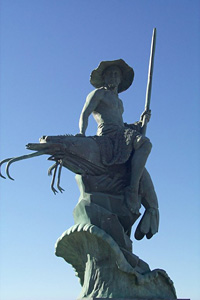 |
 |
 |
 Editorials | Environmental | August 2006 Editorials | Environmental | August 2006  
Developer, Environmentalists Clash in Puerto Penasco
 Sandra Dibble - Union-Tribune Sandra Dibble - Union-Tribune


| | Statue commemorating the town's shrimp industry. |
The future of a prime beachfront parcel in the booming Gulf of California community of Puerto Peñasco has brought a showdown between a well-respected environmental group with strong U.S. ties that is housed on the site and a U.S. developer who wants to build condominiums there.

While a Mexican judge considers their claims to the land, the bulldozers have been stopped outside the enclave operated by the 26-year-old group, CEDO A.C., or Center for the Study of Deserts and Oceans, inside the upscale Las Conchas development south of town.

“It's the last piece of property in the middle of what is the most desirable area within Puerto Peñasco,” said Las Fuentes del Mar developer Patrick Clifton, who has purchased 13 acres of the 17-acre site, and has plans for 47 town-house villas.

Untreated seawater will course through the community and form small lagoons and tide pools, according to Las Fuentes promotional literature.

But CEDO's supporters say the developer's plans encroach on property that is a vital part of its operation, including a botanical garden. “They want to take away the area that's our prime public space,” said Peggy Turk Boyer, CEDO's executive director.

The issue has erupted as development pressures have increased across the Gulf of California region. While U.S. investors are driving much of the real estate boom, environmentalists on both sides of the border are raising concerns that fragile natural areas are under growing threat.

Real estate appraiser Bruce Greenberg said the boom in Puerto Peñasco took off following the Sept. 11, 2001, terror attacks, and investors now include “the whole gamut” from U.S. baby boomers investing in a vacation home to retirees.

A four-hour drive from Tucson and Phoenix, Puerto Peñasco, also called Rocky Point, is sometimes known as Arizona's beachfront. The full-time population is 60,000, said Mayor Francisco Ramón Martínez, but the town can draw 20,000 visitors on a weekend. Some 1,500 condominiums are under construction in the city, he said.

“We want CEDO to stay, it's helped a lot of people,” Martínez said. “But this is private property . . . They have to respect private property.”

Registered as a nonprofit on both sides of the border, CEDO is a landmark in Puerto Peñasco and the Gulf of California region. It has been involved in wetland conservation and promoting sustainable fisheries in the northern gulf. Its educational programs are aimed both at local residents and tourists.

CEDO's future has become a rallying cry for those concerned about rapid growth in the gulf region. More than 1,000 people have signed an Internet petition defending the center: researchers, students, tourists, environmentalist. Exequiel Ezcurra, former director of Mexico's National Institute of Ecology and now director of scientific research at the San Diego Natural History Museum, is among those speaking out on behalf of CEDO.

“This is an idyllic place, where people are doing wonderful collaborative work,” Ezcurra said. “In my opinion, it is impossible to maintain the effort CEDO has been doing if the whole landscape is damaged in this manner.

“The bigger picture is the totally irresponsible development that is going on in Puerto Peñasco. There's no water here, and they're building condo after condo after condo,” Ezcurra said.

The center dates back decades, and the issue has driven a wedge among old friends and early supporters of CEDO. The developer's parents were among the center's original supporters.

The site was donated in the 1970s to the Desert Development Foundation by developer John McChesney. The Arizona-based group, since renamed the Seawater Foundation, is headed by Carl Hodges, former director of the University of Arizona's Environmental Research Lab and a consultant to the Biosphere 2 project.

Hodges helped start an earlier incarnation of CEDO in 1980, said Howard Weiss, a spokesman for the foundation, and hired Peggy Turk Boyer to run the organization.

With the current real estate boom, “we decided it was the appropriate time to sell most of this land for development because the values have just gone crazy,” Weiss said.

Selling the land for development goes against the original intention of the donation, Ezcurra said.

Weiss countered that the land was given to the foundation to use “as we saw fit.”

The foundation, of its own volition, has committed to setting aside four acres for CEDO, “and we're living up to our commitment to protect them,” he said.

Turk Boyer said CEDO has acquired rights to the property through continuous use. Weiss said the entire plot has remained in the hands of the Seawater Foundation through a Mexican bank trust, and none was formally donated to CEDO. With the sale of the 13 acres, four will be formally given to CEDO, Weiss said – land that he says is worth $1.5 million. “It's a terrific organization, they do wonderful work,” Weiss said.

The issue came to a head earlier this month, Turk Boyer said, when bulldozers knocked down part of a wall outside CEDO and closed off the main access road to the facility. A judge granted CEDO's request for an injunction, and now it's a waiting game for both sides.

“We were excited about this development as developments go,” said Turk Boyer, “because they're going to develop the community using salt water. We just want to have these public gardens and this public facility with space to move around.”

Sandra Dibble: (619) 293-1716; sandra.dibble@uniontrib.com | 
 | |
 |



